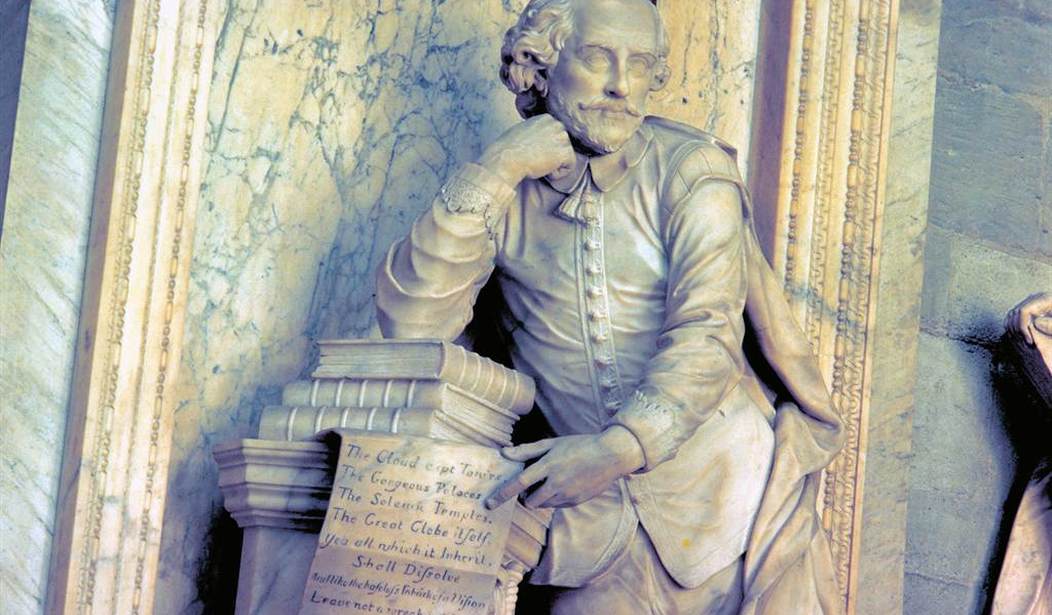If Shakespeare were alive and invited to give the commencement address at a major American university, the favorite spring sport on campus would explode with loud and shrill protest.
Blacks could object to Othello, the angry, "erring barbarian" wife-murderer. Jews could protest Shylock, the stereotypical Jewish moneylender demanding his pound of flesh. Ageists would decry a senile Lear. Feminists would despise Lady Macbeth, the Bard's most powerful woman, as a power-seeking termagant.
And besides all that, he's a very dead white man. Of course, taking offense would require the students to have a modest familiarity with Shakespeare. The Bard is not as well-read in America as he once was. Celebrating the 450th year of his birth, the Folger Shakespeare Library in Washington this week presented a lecture by scholar James Shapiro on his new book, "Shakespeare in America." He regaled the audience with wonderful stories of how Shakespeare was once a touchstone of our cultural heritage.
Alexis de Tocqueville observed of America in the 1830s that "there is hardly a pioneer hut in which the odd volume of Shakespeare cannot be found. I remember reading the feudal drama 'Henry V' for the first time in a log cabin." Shakespeare's popularity depends now on where and how you live.
When Mr. Shapiro talked to prisoners on Rikers Island in New York, the prisoners wanted to know how many plays Shakespeare wrote and if he is still alive.
Recommended
The trend of the universities burying Shakespeare with Milton and Chaucer as undeserving white men is subsiding, but the professoriate's submerging Shakespeare and Milton in a crowd of lesser works in the name of "diversity" is shocking to anyone who came of age before the academics diluted the liberal arts.
In a forward to "Shakespeare in America," Bill Clinton remembers that as a high school student in "one of those nineteenth-century frontier towns -- Hot Springs, Arkansas," he was required to memorize 100 lines from Macbeth, including the final soliloquy with the phrase "sound and fury" that William Faulkner took as the title for a novel.
Shakespeare once exemplified diversity itself -- a word that defined depth and breadth of character, insight into human nature, the power of words to enchant and delight, moving beyond a narrow political focus with a single perspective, that's been exploited for mean political purposes. He, like all playwrights, was banished from the stage by Puritans who viewed the theater with suspicion. William Penn, the Quaker founder of Pennsylvania, attacked the "infamous plays of Shakespeare and Ben Johnson," and enacted laws in 1682 against "stage plays."
But by the 19th century, Shakespeare and the theater had regained status, and children read excerpts in their McGuffey Readers, first published in 1839. At least one play a year and many of the sonnets were assigned to junior high and high school students, who could recall a quotation to decorate a term paper to impress the teacher.
Debates about Shakespeare's meanings reflect public differences and prejudices, dictated not by university but personal bias. The North and South interpreted Othello differently because of slavery. Mary Preston, a Shakespeare critic whose Southern sympathies betrayed her judgment, wrote that she found Othello flawless except that he was black. "Othello," she wrote, "was a white man!" Maya Angelou, the contemporary black poet, more than a century later projected her reality: "Shakespeare was a Black Woman."
John Wilkes Booth found justification for assassinating Lincoln in "Julius Caesar," quoting Brutus that "Caesar must bleed for it." Americans skeptical of immigration defended Shakespeare's poetry through successive generations as a standard against foreigners, who would "corrupt" the English language.
Mr. Shapiro unearthed one hilarious approach to Shakespeare from 1846 when the U.S. Army assembled in Corpus Christi, Texas, to prepare for war against Mexico. Congress had annexed Texas as a slave state, and the Army thought that a performance of "Othello" would be a distraction. James Longstreet, who would become Robert E. Lee's "old war horse," and Ulysses S. Grant, the Union commander who would become the 18th president, were alternately cast to play Desdemona. When suspension of disbelief failed, a professional actress was recruited. Casting a rough soldier to portray a demure woman was absurd, but it underscored how Shakespeare's popularity transcended class and region.
Throughout history, we've had a "Jewish King Lear," a "Shakespeare in Harlem" and characters created by the Bard performed in outer space. Vaudeville produced Prince Hamlet as a "Danish pastry," and "West Side Story" offers a Puerto Rican Juliet. That's real diversity, but it has to start with actually reading the Bard. Ay, there's the rub.

























Join the conversation as a VIP Member